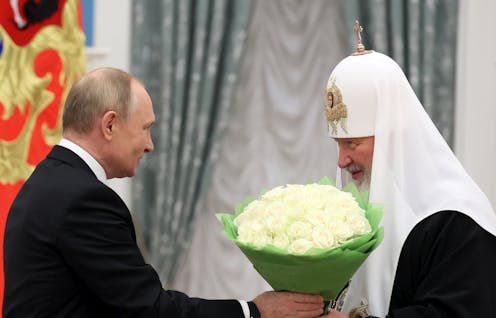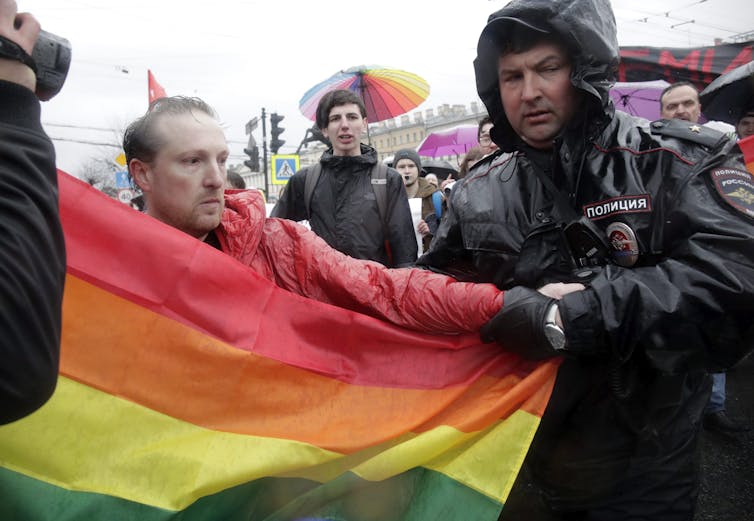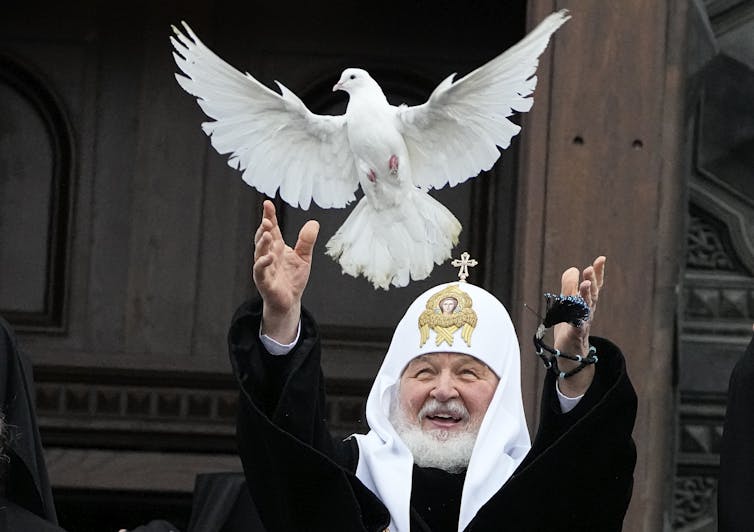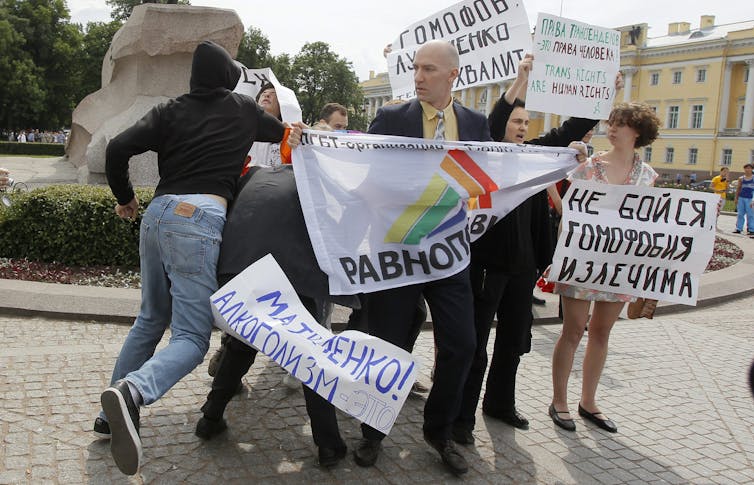
The Russian Book Union recently sent a letter to the Russian Duma, one of the chambers of the country’s parliament, expressing concern that a proposed bill expanding the scope of forbidden LGBTQ+ “propaganda” could lead to the banning of works of classic literature, including books by Leo Tolstoy, Fyodor Dostoevsky, Alexander Ostrovsky and many others.
The proposed bill is merely the latest expression of an official policy of homophobia that has been used by the Russian government for many years to promote its own legitimacy — to considerable effect.
Russia has long been one of the world’s most openly and aggressively homophobic states. Both the Russian government and the Russian Orthodox church have held up LGBTQ+ activism as the quintessential symbol of western “corruption and decadence” against which “traditional Russian values” are claimed to be the only effective bulwark.
Legislation adopted in 2013 banned anything that could be construed as promoting LGBTQ+ rights to children, including any use of the rainbow symbol and even rainbow-coloured ice cream. The present bill, which is expected to be approved in November, would expand the prohibition to anything construed as presenting information about homosexuality and would apply to all ages.

Since the onset of its war on Ukraine in February 2022, Russia’s exploitation of this bogus threat to justify its political aims has sunk to new lows.
‘Degradation, degeneration’
In announcing his “special military operation” against Ukraine on Feb. 24, 2022, Russian President Vladimir Putin accused the West of “aggressively imposing … attitudes that are directly leading to degradation and degeneration, because they are contrary to human nature.”
Russian Orthodox Patriarch Kirill (technically the Bishop of Moscow, birth name Vladimir Mikhailovich Gundyayev) — who prospered as a KGB informant during the Soviet period and whose rise to power paralleled Putin’s — has been even more explicit in framing the Ukraine invasion as a form of holy resistance against an alleged LGBTQ+ threat emanating from the West.
In a March 2022 sermon, he described the promotion of LGBTQ+ rights as the “forcible imposition of a sin condemned by divine law.” The patriarch justified the invasion most notably as a response to the alleged threat of “gay pride parades,” which he characterized as a “test of loyalty” imposed on any country hoping to become an ally of the West.

In marked contrast to the Roman Catholic Church’s Pope Francis, whose condemnation of Russian aggression has been unequivocal, Patriarch Kirill has been nothing short of rabid in his support for Putin’s war, even going so far as to promise total absolution of sins to any Russian soldiers who die in battle.
Presumably these sins include the rape, torture and summary execution of Ukrainian civilians. How does a so-called “man of God” justify such horrors? Because the alternative — a world in which LGBTQ+ people enjoy equal rights — is apparently even worse.
Fear-mongering
Although not often discussed in the western media, homophobic fear-mongering has been a cornerstone of Russia’s domestic propaganda campaign to drum up support for its war in Ukraine. Russian media tycoon Konstantin Malofeyev has used his bully pulpit to claim that “our enemy really holds the propaganda of sodomy as the core of its influence.”
As one Russian mother expressed to her friend after her son was called up: “It’s terrible, of course. But better he dies over there, than if NATO conquers us and makes him gay.”
The Russian propaganda machine has, apparently, succeeded in persuading much of the Russian public to accept three spurious premises:
1) NATO intends to invade Russia;
2) NATO’S principal aim is to make Russian children gay;
3) People aren’t born gay, but become so through the pernicious influence of “corrupt” others.
Personal close call
I became personally aware of Russia’s linking of the perceived threats posed by NATO and LGBTQ+ rights after being forced to flee the country mid-pandemic in 2020 with my pregnant wife in circumstances frighteningly reminiscent of the nail-biting climactic scene in the film Argo.
Agents from the Ministry of Internal Affairs were nipping at our heels right up to the moment we slipped through immigration at St. Petersburg’s Pulkovo airport.
In our case, the Canadian embassy was less helpful than in the film. Its response to my panicked text sent from an airport taxi was to provide me with a list of Moscow lawyers.
Shortly after my escape from the country, I was astonished to come across a nonsensical hit piece published in the Russian media.
Although I had merely been conducting innocuous historical research on a non-Slavic minority in Russia’s remote south, the article accused me of being “a NATO spy” working on behalf of “the Anglo-Saxon powers” to destroy Russia’s territorial integrity, the inevitable outcome of which would be holding Pride parades in the North Caucasus region of southern Russia.
Russian hypocrisy
Russia’s notoriously corrupt elites are themselves hardly known to live according to “traditional values,” and homosexuality is acknowledged even among Putin’s inner circle.
A male acquaintance reports having been invited to liaisons in luxury hotels by numerous well-known Russian politicians and businessmen, although he notes they generally have wives and children and do not consider themselves gay.

Hypocrisy on a different front extends to Patriarch Kirill.
He’s believed to be fabulously wealthy — with a personal net worth estimated at between four and eight billion dollars — enjoying at least nine palatial residences at home and abroad, luxury cars, a yacht and a private jet even as he preaches the virtues of poverty to his flock.
The strategy of the Russian state, in tandem with the Russian Orthodox Church, to use LGBTQ+ rights as a red-button issue to win support for their criminal war campaign has a lot in common with the United States Republican Party’s cynical exploitation of the abortion debate and other social issues (including LGBTQ+ rights) over the past four decades.
In both cases, a deliberate policy of inflaming the ignorant and irrational passions of broad segments of the population appears to have great success in stifling science and rational discourse — along with any level of human compassion.
Richard Foltz does not work for, consult, own shares in or receive funding from any company or organization that would benefit from this article, and has disclosed no relevant affiliations beyond their academic appointment.
This article was originally published on The Conversation. Read the original article.







